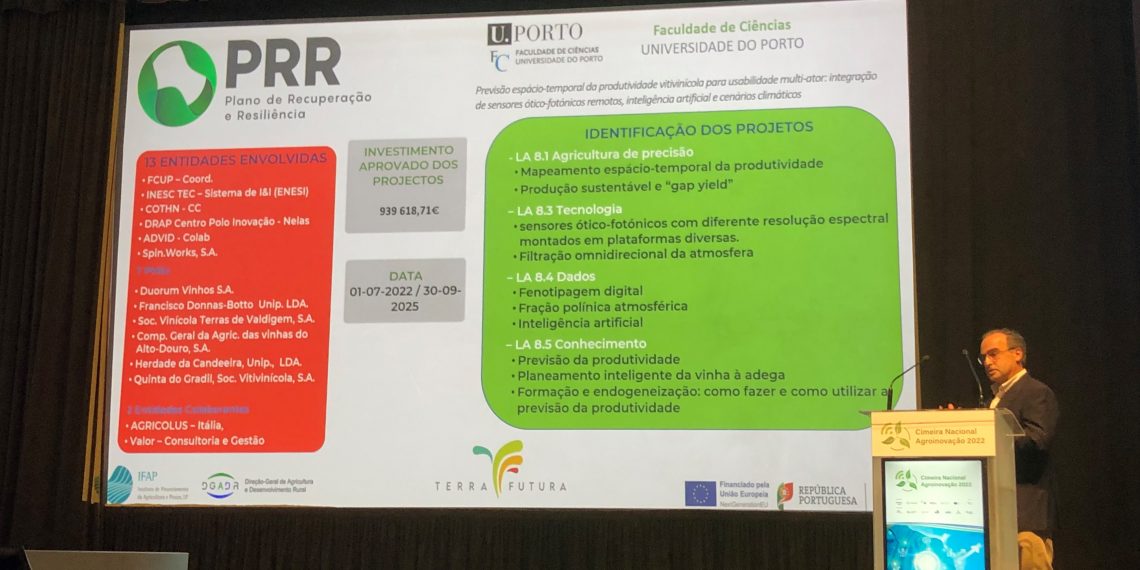The development of a new wine productivity forecasting system that considers the time-space dimension of production, and multi-actor usability, to support initiatives by small and medium-sized enterprises (SMEs), as well as regional, national and international regulatory institutions in the wine sector. This is the main objective of the Wine4cast project, an initiative featuring INESC TEC, supported by the “Recover Portugal” grant – Recovery and Resilience Plan (PRR).
The forecasting systems that have been used in winegrowing in Portugal, and in other countries, have limitations in terms of sampling, with reduced space-time transferability; their implementation costs are significantly high, and the results are not quite thorough – the fact that they’re obtained close to the harvest period hinders their usefulness. These are some of the factors limiting the full implementation of current productivity forecasting approaches at national and international level. The Wine4cast project – Space-time prediction of wine productivity for multi-actor usability: integration of remote optical-photonic sensors, artificial intelligence and climate scenarios, aims to collect data from various sources i.e., sensors incorporated in different platforms, e.g., satellites, (micro) drones or smartphones, and tomography of plant organs, associating these data with climate scenarios and biophysical elements part of the vineyard. The main goal is to combine all the information and use artificial intelligence techniques to obtain more accurate and efficient models of productivity forecasting, so they can be used by wine producers in their activities – focusing on the wine products market and on the regulatory bodies of the wine and vineyards sector.
According to Mário Cunha, professor at the Faculty of Sciences of the University of Porto (FCUP) and a researcher at INESC TEC’s Centre for Robotics in Industry and Intelligent Systems (CRIIS), “the wine sector is an important asset to the national economy, with increasing international prestige. Despite all technological advances in the sector, wine productivity remains highly dependent on the climate, causing significant interannual fluctuations”. The project manager stated that “productivity forecasting is a useful tool to minimise the risks caused by productivity variability, addressing economic, political, sociocultural, environmental and legal technological aspects relevant to the strategic management of the sector”.
FCUP, in collaboration with INESC TEC, will benefit from three years and a total €940K to develop innovative technologies that allow testing the productivity forecast and making it available to end users, which may be wine producers, agro-technological service providers, insurance companies, regional, national and international bodies responsible for regulating the sector, etc.
Wine4cast partner entities signed the PRR financing agreement on October 12, within the scope of the 2022 edition of the National Agro-innovation Summit, an event that took place in Santarém, aiming to promote knowledge and innovation in the sector and rural territories, presenting the results of innovation projects related to agro-business.
This research project is included in the “Agriculture 4.0 and Sustainable Territories” initiative of the PRR’s 2030 Innovation Agenda for Agriculture, a national implementation programme scheduled to last until 2026; this Agenda will introduce a set of European reforms and investments aimed at helping Portugal restore a sustained economic growth after the pandemic.
In addition to FCUP and INESC TEC, the project includes five more partners, an international partner (Italy) and six SMEs.
The INESC TEC researcher mentioned in this news piece is associated with UP-FCUP.



 News, current topics, curiosities and so much more about INESC TEC and its community!
News, current topics, curiosities and so much more about INESC TEC and its community!